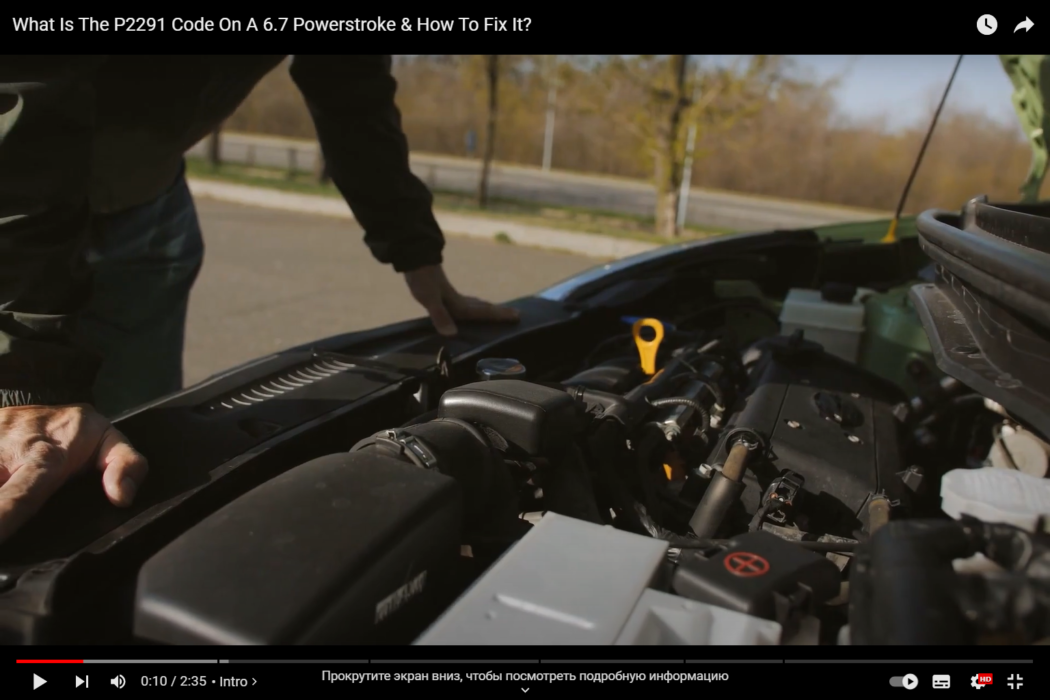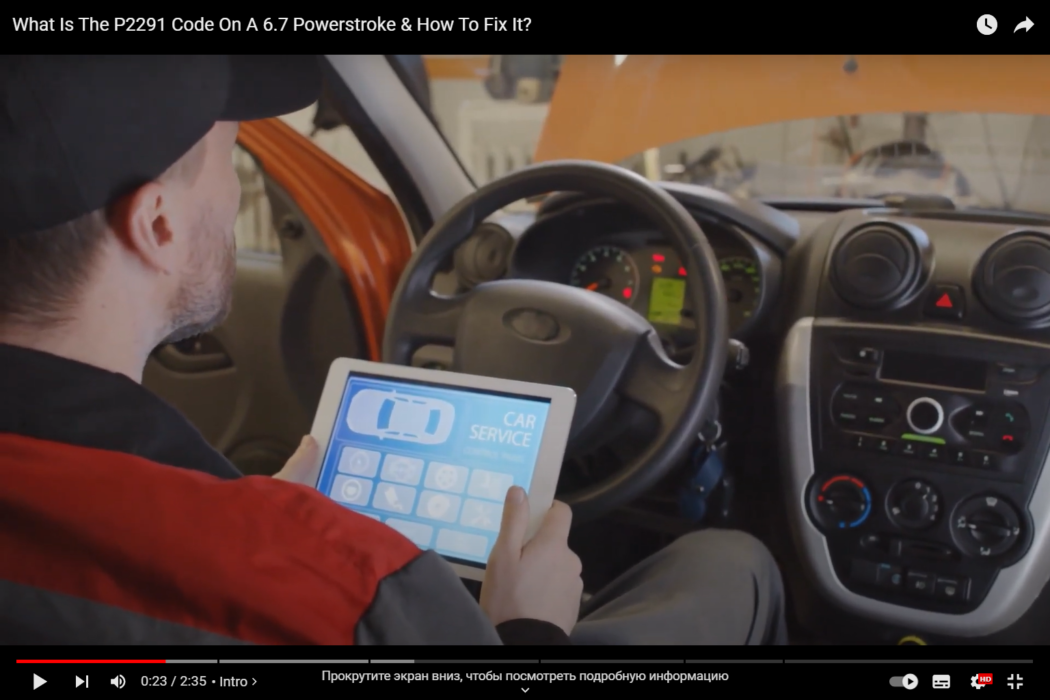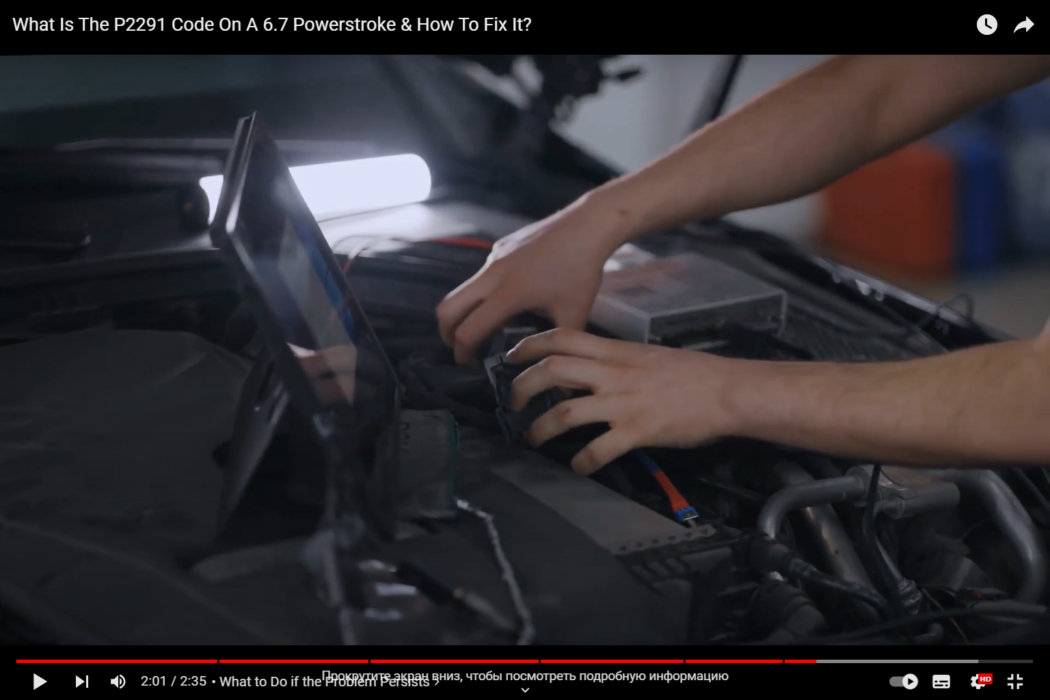Every vehicle owner dreads seeing a warning light on their dashboard. One of the most perplexing codes you might encounter with your 6.7 Powerstroke engine is P2291. Understanding its implications and knowing how to address it can save you both time and money.
What is the P2291 Code?
The P2291 code is a diagnostic trouble code (DTC) that indicates an issue related to the injector control pressure sensor circuit. This sensor plays a vital role in the engine’s performance by monitoring the control pressure of the fuel injector. When the sensor detects a deviation from the expected range, the P2291 code is triggered.
Common Causes of P2291 Code
The complexity of modern engines can lead to a variety of issues triggering the P2291 code. Burstiness in the engine’s performance may arise from:
- Faulty Injector Control Pressure Sensor: A malfunctioning sensor can send inaccurate data to the engine control module (ECM), leading to improper fuel injection;
- Wiring or Connector Issues: Damaged wiring or poor connections can disrupt the communication between the sensor and the ECM, causing the code to appear;
- Fuel Delivery Problems: Inadequate fuel supply to the injectors can result in pressure irregularities, triggering the code.
Diagnosing the Issue
To pinpoint the exact cause of the P2291 code, a thorough diagnosis is essential. This can involve:
- Using a Scan Tool: A scan tool can provide real-time data on sensor readings, helping identify irregularities;
- Visual Inspection: Checking the wiring and connectors for any visible damage;
- Fuel Pressure Test: Testing the fuel pressure to ensure it’s within the recommended range.
How To Fix the P2291 Code
Addressing the P2291 code promptly can prevent further damage and ensure optimal engine performance. Here’s a step-by-step guide to resolving the issue:
- Check Wiring and Connections: Inspect all wiring and connectors related to the injector control pressure sensor. Repair or replace any damaged components;
- Replace the Sensor: If the sensor itself is faulty, replacing it with an OEM or high-quality aftermarket sensor is crucial;
- Verify Fuel Pressure: Ensure the fuel pressure is within the manufacturer’s specifications. If not, diagnose and fix the fuel delivery system;
- Clear the Code: After making the necessary repairs, use a scan tool to clear the code and reset the ECM.
Comparison Table: OEM vs. Aftermarket Sensor
| Aspect | OEM Sensor | Aftermarket Sensor |
|---|---|---|
| Quality | Assured | Varies |
| Price | Higher | Affordable |
| Longevity | Reliable | Mixed |
| Warranty | Usually Better | Varies |
Understanding the Impact of P2291 Code
Effects on Engine Performance
The P2291 code doesn’t just illuminate a dashboard light; it can significantly affect your 6.7 Powerstroke engine’s performance. Burstiness in engine behavior might manifest as:
- Reduced Power: The engine might struggle to deliver its full power, affecting acceleration and towing capabilities;
- Poor Fuel Efficiency: Inaccurate fuel injection due to sensor issues can lead to decreased miles per gallon;
- Rough Idling: You might notice the engine idling roughly or even stalling at times;
- Increased Emissions: Incorrect fuel injection can result in higher emissions, potentially causing you to fail emissions tests.
Potential Long-Term Consequences
If left unaddressed, the P2291 code’s burstiness in your engine’s behavior could lead to more severe problems:
- Catalytic Converter Damage: Unburned fuel due to improper injection can damage the catalytic converter, leading to expensive repairs;
- Engine Damage: Inconsistent fuel delivery can cause engine components to wear out prematurely or overheat, causing lasting damage;
- Engine Misfire: Burstiness can lead to engine misfires, which not only affect performance but also contribute to increased wear and tear.

DIY vs. Professional Help: Making the Right Choice
Taking Matters into Your Own Hands
While addressing the P2291 code might seem like a challenging task, some vehicle owners with mechanical aptitude might consider tackling it themselves. Burstiness in your decision-making process might revolve around:
- Skills and Knowledge: Do you have experience with diagnosing and repairing engine-related issues?;
- Tools: Do you possess the necessary tools and equipment to carry out accurate diagnostics and repairs?;
- Time Commitment: Are you prepared for the time it might take to research, troubleshoot, and implement a fix?
The Professional Advantage
Burstiness in the complexity of modern engines can make seeking professional help a prudent choice:
- Accurate Diagnostics: Mechanics have specialized tools that can quickly identify the exact cause of the P2291 code;
- Experience: Professionals have encountered and resolved similar issues, allowing for efficient and effective solutions;
- Warranty Considerations: If your vehicle is still under warranty, getting the problem addressed by professionals can ensure compliance with warranty terms.
Preventive Measures for P2291 Code
Regular Fuel System Maintenance
Burstiness in the form of regular maintenance can prevent the P2291 code from appearing in the first place. Consider these preventive measures:
- Fuel Filter Replacement: Replace the fuel filter at recommended intervals to ensure proper fuel flow to the injectors;
- Fuel Additives: Use high-quality fuel additives that can help keep injectors clean and functioning optimally;
- Fuel System Inspections: Include fuel system checks during routine maintenance to catch any potential issues early.
Addressing Issues Promptly
Burstiness in addressing even minor engine problems promptly can prevent them from escalating:
- Dashboard Warnings: Pay attention to warning lights and take action if any illuminate.
- Strange Noises: Unusual sounds from the engine could indicate problems; investigate them promptly.
Wrapping Up: Your Engine’s Well-being
Maintaining Your Engine’s Health
In the realm of burstiness and complexity that is engine maintenance, vigilance pays off. By understanding the P2291 code and its implications, you can maintain your 6.7 Powerstroke engine’s health and enjoy optimal performance.
Advanced Troubleshooting: Addressing Underlying Causes
Deeper Insights with Diagnostic Tools
When dealing with burstiness in engine issues, utilizing advanced diagnostic tools can provide detailed insights. Some tools include:
- Oscilloscope: This tool can help visualize sensor waveforms, aiding in pinpointing irregularities;
- Pressure Gauges: Using pressure gauges to measure injector control pressure can uncover discrepancies;
- Data Loggers: Data loggers record sensor readings over time, assisting in identifying intermittent issues.
Analyzing Data Patterns
Burstiness in data patterns can provide valuable clues about the root cause:
- Intermittent Issues: If the P2291 code triggers intermittently, consider inspecting wiring and connectors for loose connections;
- Correlation with Engine Load: Analyzing whether the code appears during specific driving conditions can offer insights into the problem’s source.

Navigating Replacement Parts: OEM vs. Aftermarket
OEM Parts: Burstiness in Assurance
Opting for Original Equipment Manufacturer (OEM) parts can offer several advantages:
- Reliability: Burstiness in OEM parts’ quality is assured, as they are made to meet the manufacturer’s specifications;
- Compatibility: OEM parts are designed to fit seamlessly with your 6.7 Powerstroke engine, minimizing installation issues.
Weighing Aftermarket Options
Aftermarket parts can provide cost-effective solutions, but burstiness in quality can vary:
- Variety: Aftermarket parts offer a wider selection, potentially allowing you to choose based on your preferences;
- Research: Burstiness in researching reputable aftermarket brands is crucial to ensure you’re getting a reliable product.
Expert Insights: The Mechanic’s Perspective
Burstiness in Professional Opinion
Gaining insight from experienced mechanics sheds light on addressing the P2291 code:
- Precise Diagnostics: Mechanics rely on their expertise and diagnostic tools to accurately identify the underlying issue;
- Timely Resolution: Burstiness in addressing the code promptly can prevent additional damage and save on repair costs.
Consultation and Collaboration
Engaging in a conversation with a mechanic provides a collaborative approach:
- Sharing Observations: Burstiness in sharing any observations or symptoms you’ve noticed can aid mechanics in diagnosing the issue;
- Asking Questions: Burstiness in asking questions about the problem and its potential solutions can expand your understanding.
Future-Proofing: P2291 Prevention Strategies
Embracing Regular Maintenance
Burstiness in consistent maintenance practices can prevent engine issues:
- Scheduled Services: Follow the manufacturer’s recommended maintenance schedule to keep your engine in top shape;
- Fluid Checks: Regularly check and replace engine fluids to maintain optimal performance.
Ongoing Learning
Burstiness in your quest for knowledge about your vehicle’s systems and components can empower you:
- Owner’s Manual: Familiarize yourself with your vehicle’s owner’s manual to understand maintenance guidelines;
- Online Resources: Utilize reputable online forums and resources to learn from other owners’ experiences.
Exploring Engine Performance Tuning
Enhancing Burstiness: Unleashing Power Potential
Engine Tuning Basics
Engine tuning is all about maximizing burstiness in engine performance. It involves adjusting various parameters to optimize power, efficiency, and overall driving experience. While the P2291 code focuses on troubleshooting issues, engine tuning takes a proactive approach.
Benefits of Engine Tuning
Tuning can lead to burstiness in improvements such as increased horsepower, improved torque, and enhanced fuel efficiency. With the help of specialized software and equipment, mechanics or skilled enthusiasts can tweak factors like fuel injection timing, air-fuel ratio, and ignition timing.
Tuning Considerations
While engine tuning can offer impressive burstiness in performance gains, it’s essential to strike a balance between power and reliability. Extreme tuning can put additional strain on engine components and potentially lead to issues if not done carefully. Consulting with professionals experienced in tuning is advisable.

Digital Solutions: OBD-II Scanners and Apps
Bridging Burstiness with Technology
The Power of OBD-II Scanners
On-Board Diagnostics (OBD) II scanners provide burstiness in real-time insights into your vehicle’s health. These handheld devices can read diagnostic trouble codes, including the P2291 code, and provide detailed information about the issue.
Utilizing Diagnostic Apps
With the prevalence of smartphones, burstiness in diagnostic apps has become increasingly popular. These apps connect to OBD-II scanners via Bluetooth and offer burstiness in user-friendly interfaces that display real-time data, including sensor readings and trouble codes.
Remote Diagnostics and Notifications
Some advanced OBD-II scanners and apps offer burstiness in remote diagnostics, allowing you to monitor your vehicle’s health even when you’re not in it. Burstiness in receiving notifications about potential issues can help you address them proactively.
Conclusion
In conclusion, the P2291 code on your 6.7 Powerstroke engine demands attention. By understanding its meaning, causes, and solutions, you can ensure a smooth-running engine and avoid further complications.
FAQs
It’s recommended to address the issue promptly to prevent potential damage and poor engine performance.
While a clogged fuel filter can cause fuel delivery issues, it might not be the sole cause of the P2291 code.
The code’s definition might be consistent, but its specific causes and solutions can vary among different vehicles.
If you’re experienced with automotive wiring, you can attempt it; otherwise, consulting a professional is advisable.
Regular maintenance and timely inspections of the fuel system can help prevent the code from appearing.











